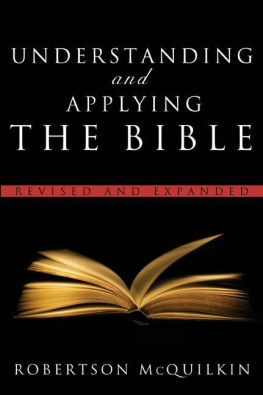Table of Contents
Landmarks
Asking the Right Questions
By now, I hope you are excited and eager to read the Bible and apply it to your life. Armed with the four foundational questions (from chap. 5), the four aspects of application (from chap. 9), and an understanding of the fallen condition and gospel solution (chaps. 7 and 8), youre ready to dive into Gods Word. Along with David you believe that it is
more to be desired... than gold,
even much fine gold;
sweeter also than honey
and drippings of the honeycomb. (Ps. 19:10)
So it may seem strange to say that just when you are most excited to apply the Bible to your life, you are in danger of making a common mistake in Christian living. With our focus on what tools we can use to grow in our relationship with God and others, we can begin to think that becoming more like Christ is something we can produce by our own efforts.
Paul addresses a similar issue in Galatians. He asks his readers a rhetorical question to remind them of a crucial spiritual truth: Having begun by the Spirit, are you now being perfected by the flesh? (Gal. 3:3).
The Galatians were being told that, while believing the gospel is how the Christian life begins, their growth in the Christian life depended on their own efforts to obey the Mosaic law. But just as we cannot make ourselves right with God based on our own efforts, we cannot grow in godliness through our own efforts.
Yet we must also avoid the opposite mistake of thinking that we are completely passive when it comes to our spiritual growth. All throughout the Bible (including the New Testament) there are countless commands that God expects us to obey. Explaining the nature of his ministry, Paul says that he has received grace and apostleship to bring about the obedience of faith for the sake of his name among all the nations (Rom. 1:5). A central goal of Pauls ministry is to lead people to a growing obedience to God that flows from their faith in Christ.
When Jesus commissions his followers to take the gospel to the ends of the earth, he also emphasizes the goal of obedience:
And Jesus came and said to them, All authority in heaven and on earth has been given to me. Go therefore and make disciples of all nations, baptizing them in the name of the Father and of the Son and of the Holy Spirit, teaching them to observe all that I have commanded you. And behold, I am with you always, to the end of the age. (Matt. 28:1820 )
Obedience to all that Jesus commands requires intentional effort and action, not passively waiting for God to zap us into godliness.
So how should we think through the relationship between Gods role in our spiritual growth and ours? An excellent starting point is Philippians 2:1213.
A Key Passage: Philippians 2:1213
Paul had a very close relationship with the church at Philippi. In the midst of reminding the Philippians of his love for them and the beauty of Jesus Christ, Paul writes:
Therefore, my beloved, as you have always obeyed, so now, not only as in my presence but much more in my absence, work out your own salvation with fear and trembling, for it is God who works in you, both to will and to work for his good pleasure. (Phil. 2:1213 )
Paul tells believers to work out our own salvation. But he also stresses that God is the one at work in us for his good pleasure. So even though Paul begins with our responsibility (work out your own salvation with fear and trembling), he grounds it in what God has done and is doing (for it is God who works in you). Lets look at each of these, starting with Gods work.
Gods Work
Paul lists two specific things God does. First, he produces the desire to obey him . Looking ahead to the new covenant, God promised to give his redeemed people a new heart and write his law on our renewed hearts:
And I will give you a new heart, and a new spirit I will put within you. And I will remove the heart of stone from your flesh and give you a heart of flesh. (Ezek. 36:26)
For this is the covenant that I will make with the house of Israel after those days, declares the Lord : I will put my law within them, and I will write it on their hearts. And I will be their God, and they shall be my people. (Jer. 31:33)
Because of what Jesus has done for us, we experience these blessings of the new covenant. On top of that, Christ also transforms us from being slaves to sin into slaves of God: But now that you have been set free from sin and have become slaves of God, the fruit you get leads to sanctification and its end, eternal life (Rom. 6:22). Through the work of the gospel, God gives his people the desire to obey him.
Second, God gives us the power to obey him . Before we know Christ, we are unable to obey God. Note what Romans 8:78 says: For the mind that is set on the flesh is hostile to God, for it does not submit to Gods law; indeed, it cannot. Those who are in the flesh cannot please God. But speaking of the new covenant, God promised to enable his redeemed people to obey them. Lets go back to Ezekiel 36 and look at verse 27 this time: And I will put my Spirit within you, and cause you to walk in my statutes and be careful to obey my rules.
Romans 8:11 sheds further light on what the Holy Spirit does in our lives: If the Spirit of him who raised Jesus from the dead dwells in you, he who raised Christ Jesus from the dead will also give life to your mortal bodies through his Spirit who dwells in you. The life that God gives us refers not only to the future resurrection of our bodies but also to the new spiritual life we experience in the present. One of the most important things the Holy Spirit does in the life of the believer is empower us to walk in obedience. In Romans 8:13, Paul writes, For if you live according to the flesh you will die, but if by the Spirit you put to death the deeds of the body, you will live. As believers we have the Spirit of God giving us the ability to obey God.
All three persons of the Trinity are involved in the work of life transformation. The Father calls his children to be holy as he is holy (1 Pet. 1:1417) and predestines us to be conformed to the image of his Son (Rom. 8:29). Thus the Son is the ultimate pattern of Gods work in our lives, and it is his work on the cross that makes conformity to him even possible. Through our union with him we share in his death and resurrection, and are therefore able to walk in newness of life (Rom 6:111). The Spirit is the one who applies the benefits of Christs work to us, and this includes the application of Scripture to our Christian walk. He produces fruit in our lives that reflects the character of Christ himself (Gal. 5:2224 ).
Our Work
Growth in godliness does not come by waiting for God to zap us. A helpful starting point for thinking about our role is Pauls statement in Romans 10:17: So faith comes from hearing, and hearing through the word of Christ. We work out our own salvation by believing the good news about Jesus Christ and his work on our behalf.
We also pray for God to reveal sin in our lives and change our thoughts, beliefs, desires, and actions, perhaps along the lines of Psalm 19:1214:
Who can discern his errors?
Declare me innocent from hidden faults.
Keep back your servant also from presumptuous sins;
let them not have dominion over me!
Then I shall be blameless,
and innocent of great transgression.
Let the words of my mouth and the meditation of my heart
be acceptable in your sight,
O Lord , my rock and my redeemer.
Prayer aligns us with Gods will as we confess our sins and beg for him to transform us into the image of Jesus Christ.
God has also given us fellow believers to encourage and stimulate us to turn from our sins, trust in Gods promises, and pursue good works. Hebrews 10:2325 captures this reality well:














